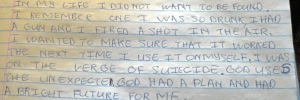Life After e’Lollipop
10 May 2010
Here’s a copy of Jared Orlin’s article on A MILLION COLOURS from the April 15th edition of South Africa’s YOU magazine. Fantastic article!
To sit with Muntu Ndebele on the film set of A MILLION COLOURS gives me the distinct sense that the pleasure is all mine. After all, the scenes portrayed before us are his life story, although the adventure, danger and romance seem more fitting of a Hollywood movie than of a real life. I pinch myself from from time to time, startled by the truth that this really happened. To him. To this guy, Muntu, here on my left.
 As the film’s Associate Producer, Muntu has special access and advisory oversight on the set. When he is not watching the film monitor or coaching actor Wandile Molebatsi on what it means to play “Muntu”, he is writing in a journal. He writes to remember and, I suppose, at times to forget. Writing his story has been his healing therapy ever since he hit rock bottom more than 10 years ago. The film doesn’t leave out the dark realities of his past – his fall from grace just months after the 1976 blockbuster “e’Lollipop” made him South Africa’s most beloved childhood star. Forced into hiding after participating in the 16 June 1976 student uprising in Soweto, Muntu’s life spiraled downward into drugs, crime and despair. These moments in his journey are brilliantly portrayed by Wandile – sometimes too brilliantly, and Muntu has to turn away.
As the film’s Associate Producer, Muntu has special access and advisory oversight on the set. When he is not watching the film monitor or coaching actor Wandile Molebatsi on what it means to play “Muntu”, he is writing in a journal. He writes to remember and, I suppose, at times to forget. Writing his story has been his healing therapy ever since he hit rock bottom more than 10 years ago. The film doesn’t leave out the dark realities of his past – his fall from grace just months after the 1976 blockbuster “e’Lollipop” made him South Africa’s most beloved childhood star. Forced into hiding after participating in the 16 June 1976 student uprising in Soweto, Muntu’s life spiraled downward into drugs, crime and despair. These moments in his journey are brilliantly portrayed by Wandile – sometimes too brilliantly, and Muntu has to turn away.

I spent a day in Soweto with Muntu. Like a good tourist, I already knew the basics about the place: the forced removals that brought black people there under Apartheid; the jazz and shebeens and gospel choir; the site of the 16 June 1976 student uprising; the stomping grounds for Nelson Mandela and Desmond Tutu; that it is today nothing like it was back then…
But my real education began when Muntu stood on the road in the place where he watched young Hector Pieterson die on that fateful June day. Or maybe it when he showed me where his gang prowled, and where they took their stolen cars. No, it must have been when we entered his mother’s house. She showed me old photographs of Muntu and Norman from “e’Lollipop” and took Muntu’s South African Oscar down from the shelf. With that look that only mothers give and tears that contain a salty mixture of sorrow and joy, she said “My son (shaking her head while pondering the peaks and valleys of Muntu’s life), I thank God for second chances.” They embraced.
I took 13 pages of notes on that day in Soweto with Muntu.
“Look at this (footage of the 16 June 1976 student uprising). It looks like a movie but it’s real. The kids are dead. (Quietly/Painfully) Oh it brings back memories.”
“We were ‘repossessing’ from the apartheid regime. They robbed our land and made us slaves. We were angry.”
“I was the worst car thief. The worst because I was the best.”
“I won’t blame anyone for my mistakes. But I never gave up hope.”
“In prison, your life is worth 2 Rand.”
“During my dark years, Wendy (Muntu’s wife) was there for me. She’s so strong.”
“Crack controls your life.”
“I weighed 43kg when Uncle Andre found me.”
“It’s forgiveness that drew me to God.”
“After drugs, I went to Miracle Gym. This is my chance. Don’t blow it. But I couldn’t lift even 5kg.”
“I’ve been clean for 8 years. I want to keep building my chest.”
“I’m famous again. I speak to kids and they want my autograph.”
“I’m a living testimony that a man can change.”

From his stylish clothes, his charming smile, and his genuine nature, it’s hard to imagine Muntu with a crack pipe or hijacking a car. Then again, with the style, smile and congeniality, I’d probably hand him my keys. Anyway, gone are the days. Yes, thank God for second chances.
Now sober for eight years, Muntu who turns 50 this year (though you’d never be able to tell to look at him) is a motivational speaker to schoolchildren and inmates. His story is ultimately one of hope and redemption. And so is A MILLION COLOURS.